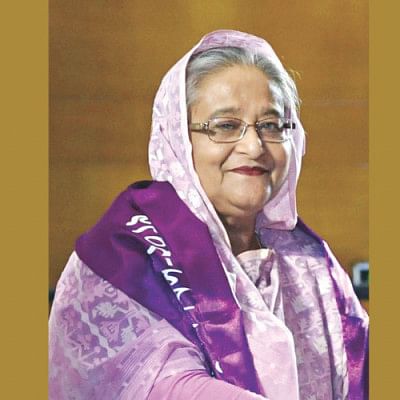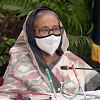PM’s China Visit: Dhaka wants stronger role of Beijing on Rohingya

Dhaka is expecting Beijing, a close ally of Myanmar, to play a more effective role in addressing the Rohingya crisis as Prime Minister Sheikh Hasina visits China from July 1-5.
“We hope Rohingya issue will get prominence during her visit. We have high hopes to see progress in this regard,” Foreign Minister Dr AK Abdul Momen said at a press briefing at his ministry yesterday.
Foreign Minister Momen, PM’s Adviser on Private Industry and Investment Salman F Rahman, State Minister for Foreign Affairs Shahriar Alam, Information and Communication Division State Minister Zunaid Ahmed Palak, officials concerned and a delegation of business leaders will accompany the PM.
During the visit, Hasina will hold bilateral meetings with Chinese President Xi Jinping, Prime Minister Li Keqiang, and Chinese National Peoples’ Congress Chairman Li Zhanshu. She will attend banquets to be hosted by Chinese premier and president.
At the meetings, the PM will discuss bilateral, regional and global issues as part of the strategic relationship between the two countries.
Bangladesh and China will sign eight memorandums of understanding and agreements on power, loan, economic and technical cooperation, investment cooperation, sharing of hydrological data, and cultural and tourism exchanges.
She will also address the Annual Meeting of the New Champion of the World Economic Forum to be held on July 1-3.
However, Rohingya repatriation will feature prominently during the meetings with Chinese leaders.
“We will tell them that Rohingya are Myanmar people. They faced persecution and fled to Bangladesh. We sheltered them temporarily,” the minister said, adding that a long-term stay of such a huge number of people may help rise of radicalism in the camps.
While speaking at the Parliament on June 26, PM Hasina said Bangladesh’s security and stability may be hampered if the Rohingya refugees cannot be repatriated soon.
“We will strongly demand speedy repatriation of Rohingya,” Momen said.
Over 741,000 Rohingyas fled to Bangladesh to escape military crackdown in Rakhine since August 2017 and joined some 300,000 Rohingyas, who had already taken shelter in Bangladesh in the previous years to escape atrocities in Myanmar where they were denied citizenship and basic rights since 1982.
Myanmar signed a repatriation deal with Bangladesh in November 2017. In June last year, the UNDP and the UN Refugee Agency struck a tripartite deal with Myanmar on creating conditions conducive for Rohingya return.
Though the repatriation was scheduled to start in November last year, the process never started as the Rohingyas claimed the condition in Rakhine was not safe for them and there was no guarantee that they would be granted citizenship.
China has been advocating for bilateral solution to the crisis since the beginning. The UN Security Council also could not take any concrete action against Myanmar thanks to the vetoes issued by China and Russia.
Referring to Chinese Ambassador to Bangladesh Zhang Zuo’s recent visit to Rohingya camps, the minister said that Zuo supported Bangladesh’s position.
“He [Zuo] said they [Rohingya] must go back to Myanmar. So, we see a change in their mindset,” Momen added.
He also said China, Russia and even India are now shifting their positions and speaking in favour of Bangladesh.
“Bangladesh always believes in peaceful solution to any problem. We solved many of the problems, including land boundary and maritime boundary with India, which is an example of how problems can be solved through dialogue,” he said.
Besides, he said, maritime dispute with Myanmar was also solved through dialogue and legal process.
“Myanmar is our friend. We solved the Rohingya problem earlier in 1980s and 1990s. We hope we can succeed the same way,” Momen said.
The minister said Bangladesh and China signed 27 MoUs and agreements worth more than $20 billion during Chinese President Xi Jinping’s visit to Bangladesh in October 2016.
“The works under these deals are in progress,” he said.
Asked about China-led Belt and Road Initiative and the concerns regarding the debt trap of Chinese loans, Momen said the government is well aware of such issues.

 For all latest news, follow The Daily Star's Google News channel.
For all latest news, follow The Daily Star's Google News channel. 








Comments